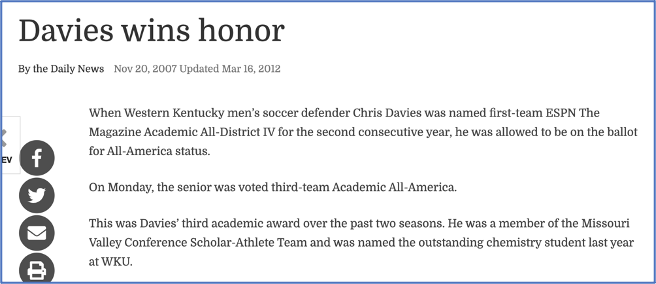Christopher has a BS in Chemistry from Western Kentucky University where he was also a very successful collegiate soccer player. As an undergrad he did an internship at the CDC. He then went to do a PhD at Purdue University. The title of his thesis was “Structural and Functional Characterization of the Endosome-associated Deubiquitinating Enzyme AMSH.” He published his results in peer-reviewed journals such as the Journal of Molecular Biology (link). He then applied for and got a postdoc fellowship from the National Institutes of Health to go to UC Berkeley to do a postdoc. From there he got a job at Genentech and now has been there for 6 years.


1. How did you decide to get a degree in biochemistry? What interested you in making this choice? What were the challenges (if any) and were your successes that drove you to achieve this degree?
My first experience working with proteins came during my summer internship at the Centers for Disease Control and Prevention (CDC) after my junior year in college. After that summer at the CDC, I returned for my senior year in college, took a biochemistry course and a nutrition course, and I thoroughly enjoyed how practical and applicable biochemistry is to all of us. From here, I knew I would pursue my graduate studies in biochemistry. The main challenge that I had going into graduate school was that I was a chemistry and mathematics major in undergrad, therefore, I had to spend a lot of time learning the basic biology concepts. Overall, my passion for learning the interface between chemistry and biology really drove me to successfully obtaining my doctorate degree in biochemistry.
2. Why are you interested in a career in Biotech? What inspires you about this work?
I am interested in biotech because this is an industry in which you can make a tangible and life-changing impact in the lives of patients. Coming out of my postdoc, I wanted to my work on real drug discovery, and learn about how basic research can be turned into drugs that make a difference. The ability to be involved in and around people who have discovered impactful medicines inspires me every day.
3. What do you want to do in your future career? What are you aiming for?
In my future career, I want to learn about how the other parts of the organization, outside of early research, fit together to form an impactful organization that makes a difference in the lives of patients.
4. In your opinion, why should a student at SF State consider a career in Biotech?
An SF State student should consider a career in biotech because this is an industry in which you can make a broad, impactful difference in the lives of people, while also being at the center of innovation.
5. Can you share something interesting about yourself?
I played soccer my entire life since I was 5 years old. I played division I college soccer, semi-professionally while pursuing my doctorate degree, and I traveled to three European tournaments with the Genentech soccer team.




